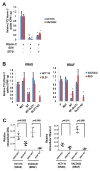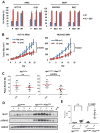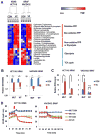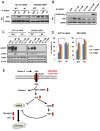Vitamin C selectively kills KRAS and BRAF mutant colorectal cancer cells by targeting GAPDH
- PMID: 26541605
- PMCID: PMC4778961
- DOI: 10.1126/science.aaa5004
Vitamin C selectively kills KRAS and BRAF mutant colorectal cancer cells by targeting GAPDH
Abstract
More than half of human colorectal cancers (CRCs) carry either KRAS or BRAF mutations and are often refractory to approved targeted therapies. We found that cultured human CRC cells harboring KRAS or BRAF mutations are selectively killed when exposed to high levels of vitamin C. This effect is due to increased uptake of the oxidized form of vitamin C, dehydroascorbate (DHA), via the GLUT1 glucose transporter. Increased DHA uptake causes oxidative stress as intracellular DHA is reduced to vitamin C, depleting glutathione. Thus, reactive oxygen species accumulate and inactivate glyceraldehyde 3-phosphate dehydrogenase (GAPDH). Inhibition of GAPDH in highly glycolytic KRAS or BRAF mutant cells leads to an energetic crisis and cell death not seen in KRAS and BRAF wild-type cells. High-dose vitamin C impairs tumor growth in Apc/Kras(G12D) mutant mice. These results provide a mechanistic rationale for exploring the therapeutic use of vitamin C for CRCs with KRAS or BRAF mutations.
Copyright © 2015, American Association for the Advancement of Science.
Conflict of interest statement
The authors declare no competing financial interests.
Figures





Comment in
-
CANCER. Revisiting vitamin C and cancer.Science. 2015 Dec 11;350(6266):1317-8. doi: 10.1126/science.aad8671. Science. 2015. PMID: 26659042 No abstract available.
-
Vitamin C as Cancer Destroyer, Investigating Sulfhydration, and the Variability in CFTR Interactome.Chem Biol. 2015 Dec 17;22(12):1575-6. doi: 10.1016/j.chembiol.2015.12.002. Chem Biol. 2015. PMID: 26687480
-
Anti-cancer effects of vitamin C revisited.Cell Res. 2016 Mar;26(3):269-70. doi: 10.1038/cr.2016.7. Epub 2016 Jan 15. Cell Res. 2016. PMID: 26768769 Free PMC article.
References
-
- Sebolt-Leopold JS, Herrera R. Nat Rev Cancer. 2004;4:937–947. - PubMed
-
- Lievre A, et al. Cancer Res. 2006;66:3992–3995. - PubMed
-
- Di Nicolantonio F, et al. J Clin Oncol. 2008;26:5705–5712. - PubMed
-
- Karapetis CS, et al. N Engl J Med. 2008;359:1757–1765. - PubMed
-
- Kawada K, et al. Clin Cancer Res. 2012;18:1696–1703. - PubMed
Publication types
MeSH terms
Substances
Grants and funding
- R01 AG048284/AG/NIA NIH HHS/United States
- S10 RR022615/RR/NCRR NIH HHS/United States
- K22 CA181280/CA/NCI NIH HHS/United States
- P01 CA117969/CA/NCI NIH HHS/United States
- P01 CA120964/CA/NCI NIH HHS/United States
- KL2 TR000458/TR/NCATS NIH HHS/United States
- HHMI/Howard Hughes Medical Institute/United States
- UL1 TR000457/TR/NCATS NIH HHS/United States
- P01 CA120964-07/CA/NCI NIH HHS/United States
- K08 CA198002/CA/NCI NIH HHS/United States
- P01 CA117969-09/CA/NCI NIH HHS/United States
- P30 CA045508/CA/NCI NIH HHS/United States
LinkOut - more resources
Full Text Sources
Other Literature Sources
Medical
Molecular Biology Databases
Research Materials
Miscellaneous

